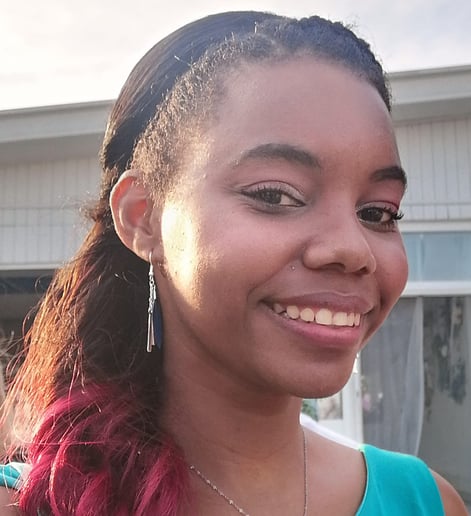Meet Diosmary García, a UOC student who shares her academic journey with us.
In this interview, Diosmary García, a UOC student, shares her enriching university experience. Through her words, we explore how the UOC promotes diversity and inclusion, supporting its students in reaching their goals and overcoming challenges.
6/7/20243 min read


Could you tell us a little about yourself and your background?
I was born in the Dominican Republic. I came to Spain at a very young age because my mother settled here and decided it was a good place for us to grow up. I’ve always been very curious, and from an early age I knew I wanted to become a journalist, especially in investigative reporting. Due to various difficulties, I ended up studying nursing assistance before I was able to pursue my dream.
What led you to choose the UOC for your studies in Spain?
I chose the UOC mainly because its methodology allowed me to balance my family and work life. When I started, I had a four-month-old baby and couldn’t afford to go to university every day. The UOC allowed me not only to study and work, but also to consider having a second child, who, coincidentally, was born when I was finishing my degree.
If you could describe the UOC in three words, what would they be and why?
Flexibility, Equity, Opportunity
And in terms of inclusion, which three words would you use to describe it and why?
Equality, Support, Values
What does inclusion mean to you?
It is the feeling of being integrated into a group or institution, regardless of your social status, ethnicity or religion.
Did you feel included at the UOC?
Very much so, and in an extraordinary way. Here, it does not matter where you are from or where you come from. What matters is your effort and your work.
How has your academic experience at the UOC been so far, and how do you think the university stands out in terms of diversity and inclusion?
Catalan universities—and I believe in Spain in general—shine for their inclusiveness. At the UOC, there are people from all over the world. It is wonderful to meet classmates from Senegal, Colombia or Germany without even realising it. Unlike other universities in Spain, the UOC reaches many countries, and that really helps it stand out.
Is there a story or anecdote you can share where inclusion played a key role in your academic success at the UOC?
Yes, in the entrepreneurship project, several classmates joined our knowledge together, and the result was a very interesting and fun project about different cultures. We finished with a grade of 9.
Have you ever been part of a project at the UOC where intercultural collaboration was key? How did it influence the outcome?
Yes, in the entrepreneurship course we created a travel agency project where each of us contributed knowledge from our respective cities and countries of origin. We were four people from three different countries, and we were really able to highlight fun and interesting facts that others didn’t know. From that project, we didn’t just end up as teammates—we became friends and learned about each other’s cultures and the things we had in common.
How do you think the UOC could reinvent inclusive education to better meet the needs of future generations of multicultural students?
It might help to offer more courses in English, as there are students from English-speaking countries who do not mix much with Spanish-speaking students. The same happens with Catalan students, who tend to express themselves only in Catalan, creating a communication barrier. Perhaps more needs to be done to break that barrier.
If you were designing an inclusive programme for the UOC, what innovative elements would you include to promote cultural diversity? What actions do you think could help highlight its diverse and inclusive character?
I would suggest a more interactive programme where everyone could use their own language, with a system that includes both language and sign language translation, since many people have hearing impairments and face more limitations.
Do you have any suggestions for further improving inclusion and diversity at the UOC? Is there anything specific you think should be implemented or improved?
As I mentioned before, access to books in formats suitable for the visually impaired and translation tools for people who are deaf or hard of hearing would help. In these cases, we should have access to printed books rather than just digital material.
Can you share an experience where the UOC exceeded your expectations in terms of support and creating an inclusive environment?
I have not had a particularly remarkable experience in that regard, but I was able to join a project team made up of people from different cities, and they made me feel part of the team.
How has interacting with classmates from different cultures, sexual orientations, gender identities or abilities influenced your experience at the UOC?
It has helped me open up and learn more about feminism and sexual diversity, as well as about other cultures.
How would you describe your UOC journey using a creative metaphor or analogy?
An adventure that is only just beginning.
Imagine you are giving a talk on diversity at the UOC. What would your key message be and how would you deliver it?
At the UOC, everyone will feel supported, embraced and included. Everyone is welcome here.
If you could write a thank-you letter to the UOC for its inclusive approach, what three things would you highlight and why?
The solidarity shown by some professors and students.
The respect for learning and for students’ opinions.
And the absence of discrimination based on ethnicity or sexual orientation.
Thank you, Diosmary.

